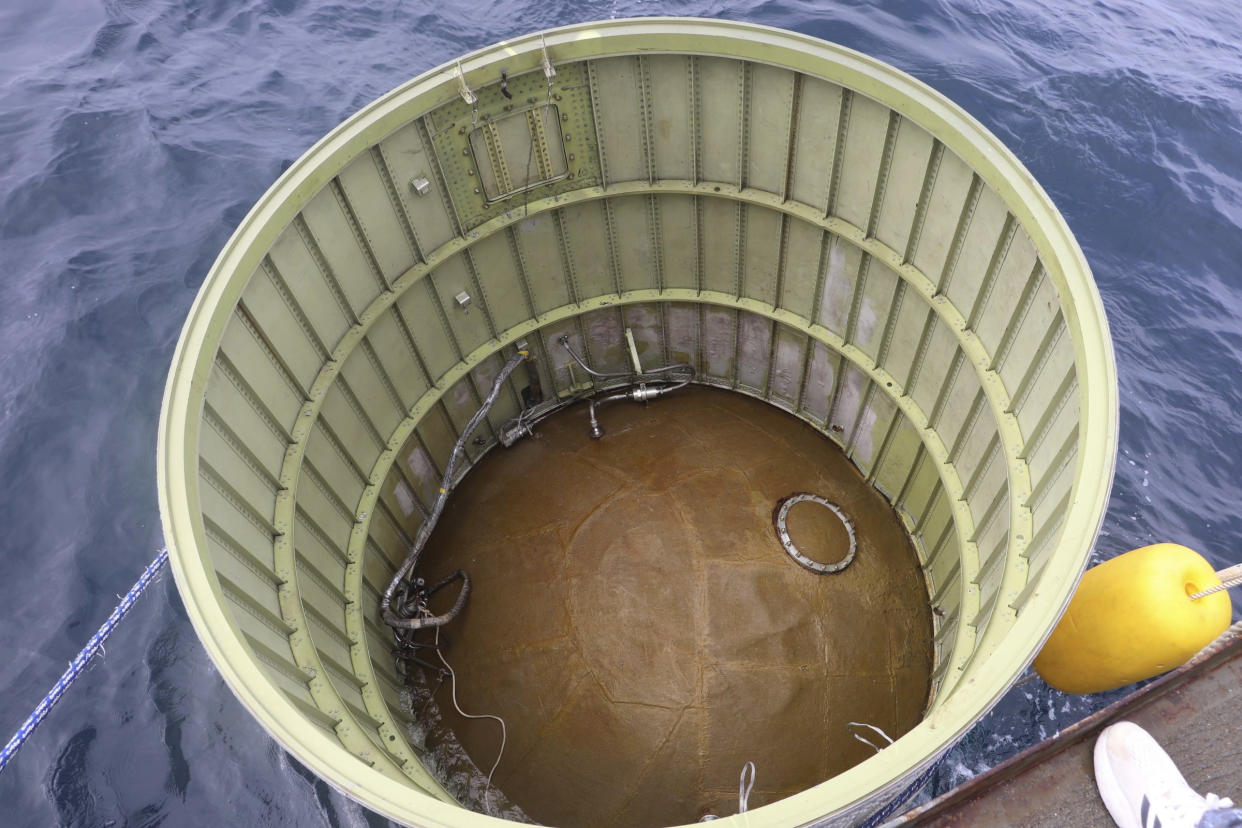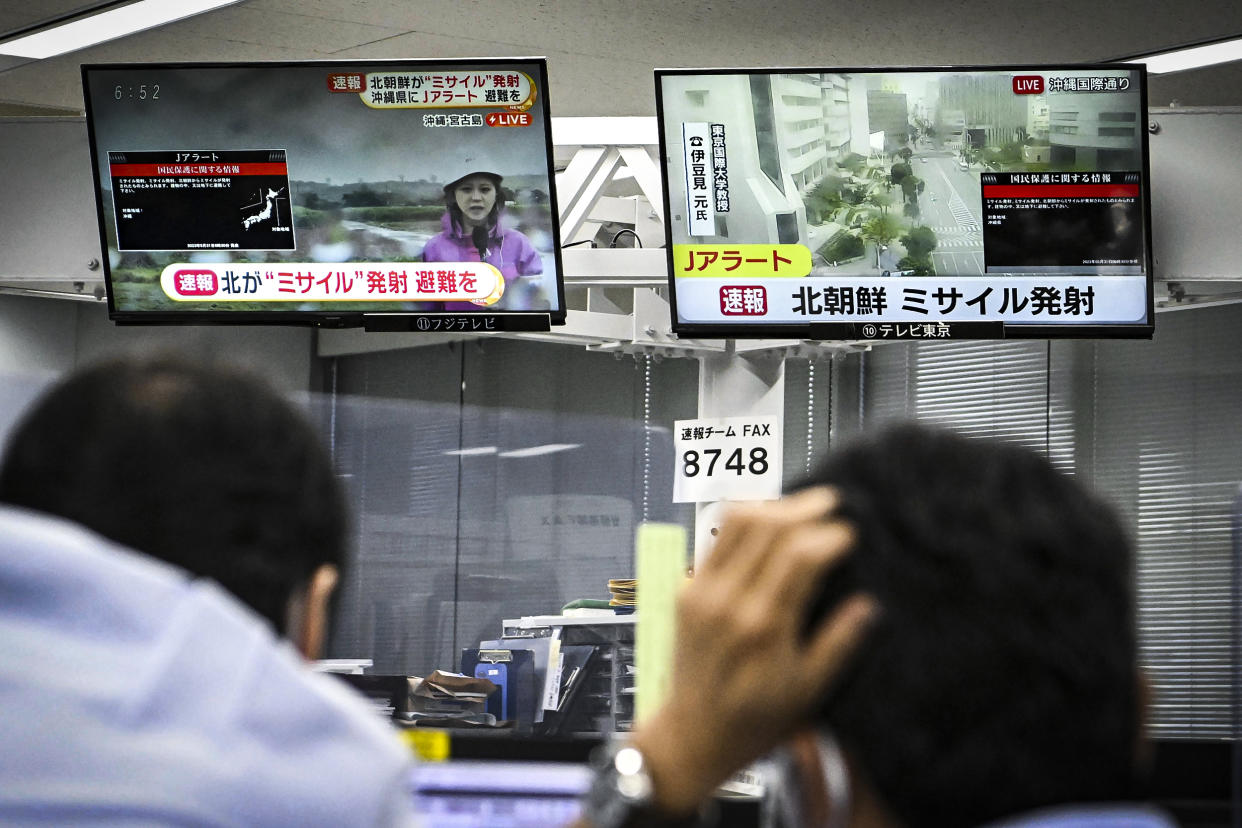North Korean spy satellite launch fails
SEOUL, South Korea — North Korea said Wednesday it failed to launch its first spy satellite into space, in a blow to the nuclear-armed state’s efforts to strengthen its military capabilities amid growing tensions with its neighbors and the United States.
Pyongyang said it would soon try another launch after learning what went wrong to send the rocket plunging into the sea following liftoff. It was an unusually frank acknowledgment of failure by Kim Jong Un’s regime, but the attempted launch sparked alarm among its neighbors, with rare emergency alerts and evacuation warnings rattling people in South Korea and Japan.
The newly developed Chollima-1 rocket, which was carrying the Malligyong-1 spy satellite, was launched as scheduled at 6:27 a.m. local time (5:27 p.m. ET Tuesday) from the Sohae Satellite Launching Ground in the country’s northwest, according to the North Korean state news agency KCNA.
It then fell into the sea off the west coast of the Korean Peninsula “after losing thrust due to the abnormal starting of the second-stage engine,” it said.
North Korea’s National Aerospace Development Administration said it would investigate what happened and address any shortcomings before it carries out another launch as soon as possible, KCNA said.
South Korea’s Joint Chiefs of Staff said it was recovering potential wreckage from the vehicle from waters about 124 miles west of the South Korean island of Eocheong. Photos shared by the South Korean National Defense Ministry showed some of the debris that had been retrieved.

In a trilateral phone call, the U.S., Japan and South Korea strongly condemned the launch, which was based on ballistic missile technology and violated United Nations Security Council resolutions. The three countries are closely monitoring the situation “with a high sense of alertness,” the Japanese Foreign Affairs Ministry said in a statement summarizing the call.
South Korea and Japan said they were monitoring for possible additional launches.
In response to the launch, loudspeakers and text messages urged residents of South Korea’s capital, Seoul, to prepare to evacuate, but the country’s Interior and Safety Ministry later said that was an error.
Jamie Park, 21, said her family woke up to emergency alerts on their phones, as well as announcements on public loudspeakers.
“My mom told all of us to get dressed and gather all our important things like passports and laptops so that we can evacuate,” she told NBC News.
The family spent about 40 minutes watching the news on television until they were sure the danger had passed.
“I know not everyone took it seriously as it isn’t the most uncommon thing, but waking up to it suddenly definitely stirred things up,” Park said.
Seoul Mayor Oh Se-hoon apologized for the confusion but said the alert had been sent out of an abundance of caution, noting that unlike on previous occasions, North Korea launched toward the south rather than the east.
Japan also issued an emergency warning in the southern prefecture of Okinawa, but it was lifted later.
North Korea said Tuesday that it planned to launch what it said was a military spy satellite between Wednesday and June 11, in part to monitor what KCNA called “the dangerous military acts of the U.S. and its vassal forces.”
Last week, the U.S. and South Korean militaries held large-scale live-fire exercises near the border with North Korea, the first of five rounds between now and mid-June. North Korea views such exercises as a rehearsal for invasion, which the U.S. and South Korea deny.
U.N. sanctions prohibit North Korea from conducting long-range and ballistic missile tests.
The country has repeatedly launched such missiles anyway, including last month, when it said it tested a solid-fuel intercontinental ballistic missile for the first time. It has also conducted six nuclear tests and is thought to be preparing for a seventh.

North Korea and South Korea remain technically in a state of conflict, after the Korean War ended in 1953 with an armistice rather than a peace treaty. South Korea, which successfully launched its first commercial-grade satellite last week, is expected to launch its own spy satellite later this year.
North Korea’s launch failure “in no way weakens the justification for increasing trilateral cooperation among South Korea, Japan and the United States,” said Leif-Eric Easley, associate professor of international studies at Ewha Womans University in Seoul.
But any attempt to toughen U.N. sanctions, he said, is likely to continue to be blocked by China and Russia, both permanent members of the Security Council, who view the sanctions as ineffective.
In a statement, the U.S. National Security Council called on North Korea to return to negotiations on denuclearization, which have been stalled since early 2019.
“The door has not closed on diplomacy but Pyongyang must immediately cease its provocative actions and instead choose engagement,” spokesperson Adam Hodge said.
He said the U.S. would take “all necessary measures” to protect the American homeland, as well as its allies South Korea and Japan.
Stella Kim reported from Seoul, Arata Yamamoto reported from Tokyo, and Jennifer Jett and Jimin Lee reported from Hong Kong.
